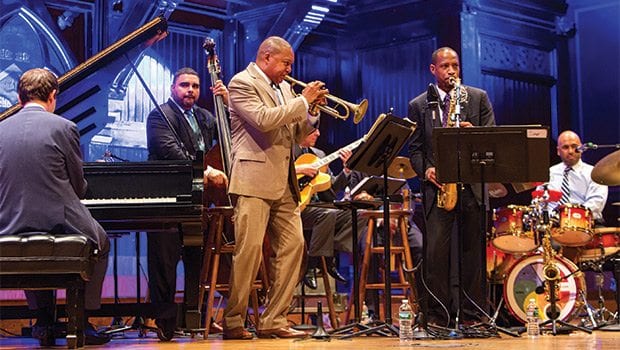‘A philosopher with a trumpet’
Wynton Marsalis plays Pulitzer prize celebration at Harvard’s Sanders Theatre

Since 1917, annual Pulitzer Prizes have singled out excellence in American journalism and the arts — literature, theater and music. Words are powerful tools in these works, even in the music awards, which often honor projects that incorporate song and speech and tell a story.
So words loomed large in the two evening performances that began and concluded last weekend’s centennial celebration of Pulitzer Prizes. Held at Sanders Theatre at Harvard University and presented by the Nieman Foundation for Journalism, the event featured Pulitzer Prize recipients who in readings and performances explored the theme “Power: Accountability and Abuse.”
Introducing the event on Saturday night was Wynton Marsalis, managing and artistic director of Jazz at Lincoln Center and director of Jazz Studies at the Juilliard School in New York. In 1997 his oratorio “Blood on the Fields,” about a slave’s journey to freedom, became the first jazz composition to win the Pulitzer Prize for Music.
Concluding the celebration on Sunday, the 15th anniversary of the Sept. 11 terrorist attacks, was an evening performance of “On the Transmigration of Souls,” by composer and conductor John Adams, winner of the 2003 Pulitzer for Music. The New York Philharmonic commissioned the work to commemorate the first anniversary of the attacks.
Introducing Marsalis on Saturday night, Harvard University President Drew Gilpin Faust described him as “a philosopher with a trumpet.”
Marsalis and his ensemble said hello with their instruments, launching a fast bebop passage. They then proceeded to both show and tell their thoughts on power, its uses and abuses. Pointing out that jazz improvisation is “an achievement of togetherness,” Marsalis led a musical and verbal reflection on what he called “fundamentals”: the need to balance freedom with responsibility, to both lead and follow, and heed both instinct and training — “all under the pressure of right now.”
Weaving in episodes from “Blood on the Fields,” as the enslaved African Jesse works his way to freedom, Marsalis spoke of the need to confront both external abuse and abuse from within. Jesse had to grow before he could deal with his external oppressors.
Diversity and harmony
Over an hour and a half, Marsalis and his six fellow players took each of these fundamentals and demonstrated them through playing music. The ensemble comprised Marsalis on trumpet; Walter Blanding on saxophone; guitarist James Chirillo; Carlos Henriquez on acoustic bass; pianist Dan Nimmer; and Ricky Gordon on washboard. Their instruments also included the basics — hands and voices.
Among the values they asserted: Diversity, showcasing in varied rhythmic patterns how jazz is an inclusive, living family tree — rooted in sub-Saharan African music and extending to Scottish folk songs and dances, the call-and-response of slaves’ work songs, the blues, Mardi Gras marches, the Afro-Cuban five-beat clave rhythmic pattern and beyond.
Drummer Ali Jackson led the ensemble in a chorus of claps to various speeds and rhythmic patterns, an infectious celebration of diversity within a coherent whole.
Repeating a simple blues refrain — “It’s all right baby, baby it’s all right” — over and over with varied rhythmic patterns, Blanding and Marsalis turned the phrases into an alluring song.
Opposition and competition as well as harmony are tools of a jazz musician, noted Marsalis. Demonstrating the challenges of responding to fellow players and their quicksilver changes in key or rhythm, Blanding recited a single sentence rapidly while switching among five different languages. His feat earned a huge ovation.
Showing what happens when players fail to listen or respond to one another, Jackson let Nimmer open a lyrical keyboard version of the Billy Strayhorn classic, “Take the A Train,” and then plowed over it by beating a different rhythmic pattern and faster pace on his drums.
“You can’t allow yourself to be more important than the music,” said Marsalis. Musicians achieve “a mutual agenda,” he added, by recognizing and appreciating “there’s a system here anyone can plug into, to create meaningful change through action.” Evoking the U.S. Constitution, Marsalis made it clear that the approach can apply to politics as well as jazz.
On Sunday, in a series of three two-hour sessions, Pulitzer Prize recipients in journalism and the arts considered power within the home, the nation and the world. Through performances, readings, talks and performances, they reflected on such topics as clergy sex abuse, domestic violence, Ferguson, the Pentagon Papers, Watergate, state-sponsored oppression and the rise of stateless terrorists like ISIS and al-Qaeda.
Sessions combined journalists’ perspectives with artists’ voices, including a video interview with “Hamilton” writer and star Lin-Manuel Miranda and a reading by Junot Díaz from his debut novel, “The Brief Wondrous Life of Oscar Wao.” Playwright Lynn Nottage introduced a scene from “Ruined,” her play about women in the Congo enduring the ravages of civil war.
Sunday evening, the centennial concluded with a performance of “On the Transmigration of Souls.” Adams, its composer, has described the work as a “memory space” that, like a cathedral, offers a meeting place for souls living and dead. Performing the 30-minute concert were the Harvard-Radcliffe Orchestra, conducted by Federico Cortese; the Tanglewood Festival Chorus, with guest conductor Lidiya Yankovskaya; and a youth choir, Voices Boston, led by its artistic director, Steven Lipsitt.
As the work began, the performers stood in silence. Then a recording recited names of victims against a distant sound of sirens and running feet. The choir and orchestra slowly joined in, the voices of the adults intertwined with the children’s choir, standing to the right of the stage. Building to a crescendo of crushing fury, with Cortese whipping his baton as if summoning ocean waves, the orchestra then yielded to the chorales, who sang phrases drawn from New York Times tributes and signs posted by victims’ loved ones near Ground Zero. Simple words like “She had a voice like an angel,” “Remember” and “Brother” rose like shards of cherished valuables found in rubble.
The Pulitzer celebration reminded its audience that, no less than journalists, artists, too, illuminate what matters.






